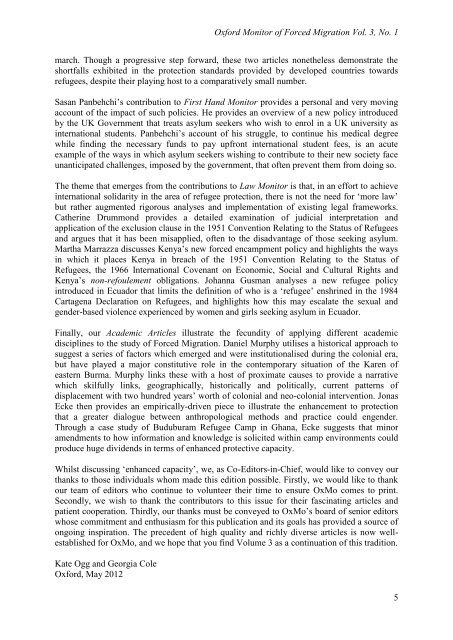OxMo-Vol.-3-No.-1
OxMo-Vol.-3-No.-1
OxMo-Vol.-3-No.-1
Create successful ePaper yourself
Turn your PDF publications into a flip-book with our unique Google optimized e-Paper software.
Oxford Monitor of Forced Migration <strong>Vol</strong>. 3, <strong>No</strong>. 1<br />
march. Though a progressive step forward, these two articles nonetheless demonstrate the<br />
shortfalls exhibited in the protection standards provided by developed countries towards<br />
refugees, despite their playing host to a comparatively small number.<br />
Sasan Panbehchi’s contribution to First Hand Monitor provides a personal and very moving<br />
account of the impact of such policies. He provides an overview of a new policy introduced<br />
by the UK Government that treats asylum seekers who wish to enrol in a UK university as<br />
international students. Panbehchi’s account of his struggle, to continue his medical degree<br />
while finding the necessary funds to pay upfront international student fees, is an acute<br />
example of the ways in which asylum seekers wishing to contribute to their new society face<br />
unanticipated challenges, imposed by the government, that often prevent them from doing so.<br />
The theme that emerges from the contributions to Law Monitor is that, in an effort to achieve<br />
international solidarity in the area of refugee protection, there is not the need for ‘more law’<br />
but rather augmented rigorous analyses and implementation of existing legal frameworks.<br />
Catherine Drummond provides a detailed examination of judicial interpretation and<br />
application of the exclusion clause in the 1951 Convention Relating to the Status of Refugees<br />
and argues that it has been misapplied, often to the disadvantage of those seeking asylum.<br />
Martha Marrazza discusses Kenya’s new forced encampment policy and highlights the ways<br />
in which it places Kenya in breach of the 1951 Convention Relating to the Status of<br />
Refugees, the 1966 International Covenant on Economic, Social and Cultural Rights and<br />
Kenya’s non-refoulement obligations. Johanna Gusman analyses a new refugee policy<br />
introduced in Ecuador that limits the definition of who is a ‘refugee’ enshrined in the 1984<br />
Cartagena Declaration on Refugees, and highlights how this may escalate the sexual and<br />
gender-based violence experienced by women and girls seeking asylum in Ecuador.<br />
Finally, our Academic Articles illustrate the fecundity of applying different academic<br />
disciplines to the study of Forced Migration. Daniel Murphy utilises a historical approach to<br />
suggest a series of factors which emerged and were institutionalised during the colonial era,<br />
but have played a major constitutive role in the contemporary situation of the Karen of<br />
eastern Burma. Murphy links these with a host of proximate causes to provide a narrative<br />
which skilfully links, geographically, historically and politically, current patterns of<br />
displacement with two hundred years’ worth of colonial and neo-colonial intervention. Jonas<br />
Ecke then provides an empirically-driven piece to illustrate the enhancement to protection<br />
that a greater dialogue between anthropological methods and practice could engender.<br />
Through a case study of Buduburam Refugee Camp in Ghana, Ecke suggests that minor<br />
amendments to how information and knowledge is solicited within camp environments could<br />
produce huge dividends in terms of enhanced protective capacity.<br />
Whilst discussing ‘enhanced capacity’, we, as Co-Editors-in-Chief, would like to convey our<br />
thanks to those individuals whom made this edition possible. Firstly, we would like to thank<br />
our team of editors who continue to volunteer their time to ensure <strong>OxMo</strong> comes to print.<br />
Secondly, we wish to thank the contributors to this issue for their fascinating articles and<br />
patient cooperation. Thirdly, our thanks must be conveyed to <strong>OxMo</strong>’s board of senior editors<br />
whose commitment and enthusiasm for this publication and its goals has provided a source of<br />
ongoing inspiration. The precedent of high quality and richly diverse articles is now wellestablished<br />
for <strong>OxMo</strong>, and we hope that you find <strong>Vol</strong>ume 3 as a continuation of this tradition.<br />
Kate Ogg and Georgia Cole<br />
Oxford, May 2012<br />
5


